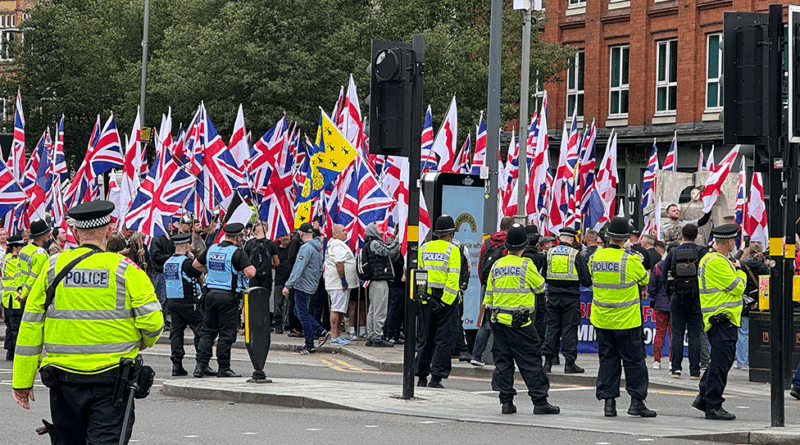UK Struck by Anti-Immigration Protests: Unrest and Detention Follow
Anti-immigration demonstrations in the UK provoked further unrest on August 2, leading to multiple individuals being detained by law enforcement. The core of north-west England, specifically Manchester, saw gatherings of protestors advocating for large-scale ‘re-migration’ who were confronted by groups opposing racial discrimination. Simultaneously, counter-demonstrations were taking place outside a London hotel that provides accommodation to asylum seekers, resembling sporadic events in the recent past that have occasionally escalated into violence.
The far-right group ‘Britain First’ initiated the Manchester march that brought the conflict into the public eye. This event was not without its share of confrontations between the two parties which prompted police intervention during the initial phase. A spokesperson for the protestors used the opportunity to voice their perspective on the issue, expressing their disapproval of immigration policies.
Grievances were aired citing issues surrounding housing and homelessness within the UK. A local resident voiced their disillusionment by stating, ‘Ours streets are full of individuals without a roof over their head, pleading for food, yet we continue to accommodate strangers in our hotels’. This perspective brought to light the concerns faced by certain citizens who believe that the resources dedicated to immigrants should be directed towards local homeless population.
Opposing this viewpoint were several counter-protestors who object to what they perceive as xenophobic attitudes. One counter-protester, fighting against the hate visible on Manchester’s streets, challenged the perspective of the demonstrators. The individual in question raised pertinent questions about who exactly the protestors would like to see ‘re-migrated’.
They presented a skeptic’s view about the intentions of the anti-immigration protestors, expressing, ‘Would the call for re-migration apply to everyone, or does it solely target individuals with a darker complexion?’. An element of mistrust towards the demonstrators’ intentions was introduced, suggesting that racial bias rather than immigration concerns were the issue at hand.
The epicentre of London, particularly the Barbican neighbourhood, saw a replication of the turbulent Manchester demonstration. Scenes of discord unfolded outside a hotel catering to asylum seekers, culminating in clashes similar to that witnessed in north-west England. Law enforcement was required to intervene in order to restore order.
Officers diffused a potentially volatile situation by dispersing groups that had amassed at an intersection in violation of the stipulated conditions. The authorities took stern steps to regain control, with the police releasing a statement about the actions taken on the ground.
The police force informed the public of several arrests made during the course of these events. The official statement listed a total of nine arrests until that point, with the majority being detained under the Public Order Act breaches. The authorities’ intervention was marked by a sense of urgency to maintain public order amidst the unrest.
Epping, a locality nestled in the north-east of London, has been another point of focus in recent times. This neighbourhood has been highly susceptible to intense confrontations similar to the events in Manchester and the Barbican neighbourhood in London. The widespread cases of disagreement and tension have shed light upon deep-seated issues relating to migration.
All these instances indicate the complexity and emotional charge connected to the issue of immigration within the UK. The events have taken a dramatic turn in recent weeks, with hostile interactions becoming increasingly commonplace. Immigration, and more specifically, ‘re-migration’ stand at the centre of the public and political discourse.
The diverse views, ranging from those demanding stringent measures and those pleading for empathy and compassion, have showcased the depth of the disagreement on these issues. The discussions touch upon societal, economic, and moral aspects, thus, turning this into a convoluted issue that demands careful deliberation.
Furthermore, these instances have ignited intense debate on how the nation should balance its internal struggles, such as homelessness, with its international responsibilities like the housing of asylum seekers. This dilemma places the government in a difficult situation, where any approach taken could lead to further conflicts.
Raising the question of inclusivity and acceptance in the society, these protests have reflected a landscape fissured by growing prejudice, discrimination, and inequality. The task at hand for policymakers is navigating these treacherous waters that entail a responsibility to not only the citizens but also those seeking asylum, thus, making the debates on immigration and ‘re-migration’ far from straightforward.



